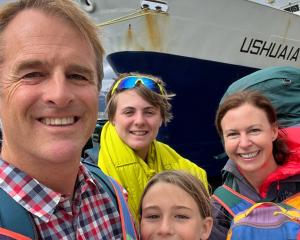IES Abroad: Can you tell us more about the inspiration behind your family's decision to take a gap year and travel to 27 countries?
Randy, Andi, Finn, and Aria (4Almonds): When we were in our twenties, we took a gap year to backpack in South America, Asia, and Australia. It was a formative experience that we wanted to share with our kids. We love living in Colorado, but it can be a somewhat narrow experience. We wanted our kids to see that the world is a vast, magical, complex place. That people can and do live all kinds of different lives. That there’s both beauty and struggle everywhere. We felt that this experience would help them make more informed choices about where they want to take their lives.
IES Abroad: What role did Randy’s experience at IES Abroad play in shaping your family's passion for travel and education?
4Almonds: My experience in Berlin with IES Abroad seeded a strong desire to see more of the world and engage with people from all different places. Berlin in 1995 was a complicated, energetic, amazing place. It was vastly different from growing up in Idaho and Oklahoma, or going to university in suburban New Jersey. I loved it and wanted more.
IES Abroad: How did you plan your itinerary and budget for your gap year trip to visit so many countries? Any tips for families considering a similar adventure?
4Almonds: We bought a big world map, mounted it on cork board, and put it up on the wall at home. We had a box of pins next to it so that anybody in the family could put pins in places that they wanted to travel to. In order to place a pin though, you had to be able to clearly describe why you wanted to go there. We had this map up about 6 months before leaving. That gave us a general sense for parts of the world that our family was keen to visit. We then looked at Lonely Planet to map out what time of year we wanted to be in each region, generally optimizing for shoulder season when the weather was still good and the crowds (and costs) weren’t at the peak. From there we booked our flight to Casablanca and took things from there. We wanted to be able to stay longer in places that resonated, so we tended to book our travel fairly last minute, determining most local travel only a day or two in advance and booking most airbnbs and hotels only a day to a week in advance. The big exceptions were when meeting up with family along the way and a few of our big intercontinental flights that we’d book four-to-six weeks in advance to get the best pricing. In terms of budget, start by building savings as far in advance as possible or figure out how you can work while traveling to fund things as you go. The countries you choose will make a big difference as well. If you spend more time in Europe or Japan, you’ll spend a lot more than if you travel in India or Argentina. The longer you stay in a place or a region, the less you’ll spend as well. But everything’s about trade-offs. Do you want to travel for a year in India and southeast Asia or would you rather spend four months in Japan and Australia?
IES Abroad: Were there any specific goals or educational objectives you had in mind when using the world as your classroom during this gap year?
4Almonds: We wanted the kids to get a hands-on understanding of history, culture, and language. We wanted them to see these things not just as academic subjects that they had to take, but as fascinating stories of people in different times and places. We wanted them to see that, while you can get around in many places speaking just English, your ability to connect with locals and truly engage is greatly enhanced if you are able to speak a bit of the local language.
IES Abroad: What were some of the most memorable cultural experiences or lessons you and your family learned while traveling?
4Almonds: Listening to The Iliad as we drove through the Peloponnesus in Greece where we could visit the ruins of many of the Greek kingdoms in the story. Visiting the township of Alexandra in Johannesburg and the Sanjay Colony in New Delhi with locals who live there. Dropping Finn off in Taipei for a month of Mandarin lessons while living with a local family. Celebrating Messi’s World Cup victory in Argentina.
IES Abroad: Can you share some of the challenges you encountered during your gap year and how you overcame them?
4Almonds: Randy being stung by a scorpion in Jordan and getting a tour of the Jordanian health care system. We luckily had family friends in Amman who helped us navigate the hospitals and get Randy the emergency care he needed. Figuring out how to have a bit of personal space while being together 24/7. We learned our rhythms as we traveled and sought to find ways to carve out personal time and space for everyone. Staying in Airbnbs gave some room for folks to re-center as needed. We also sometimes broke up and did activities 1:1 with the kids or gave them a night to Facetime with friends back home or watch TV while we went out. Getting a better sense of the kids’ learning styles and adapting our world school approaches accordingly, like alternating reading and audiobooks to accommodate our more auditory son or creating a clear rubric for their daily journaling.
IES Abroad: How did you balance education and adventure during your travels? Any strategies or resources you found particularly helpful in developing your world classroom?
4Almonds: Reading books by local authors that are about the country/culture you’re in. Mapping out timelines for subjects like Math where you need to keep up with things, otherwise you’ll get too far behind to complete the class. Audiobooks to make more of longer road trips. Finding local guides who were used to speaking with teens. Adventure drives education (safari, scuba, cliff jumping, high altitude trekking). In each of these we could find scientific angles that were interesting. Evolutionary biology and ecosystem studies on safari. Physics, chemistry, and biology with Scuba, cliff jumping, and trekking. How can we use our video of the kids jumping off a cliff to estimate the height of the cliff and their velocity when entering the water? How and why does the mix of air you breath when scuba diving impact the amount of time you can stay underwater and the speed at which you can ascend? What are the drivers of altitude sickness when trekking?
IES Abroad: Did you have any unique approaches to staying connected with friends and family back home during your journey?
4Almonds: The usuals of email and FaceTime, along with our Instagram account @4almondsabroad. We documented our travels there, and it was a great avenue to keep in touch with family and friends, in addition to meeting new people as part of an engaged travel community. We also met up in person with family in Southern Africa for a safari and in Japan for two weeks of travel. We did try to send as many postcards as possible too, because who doesn’t love receiving a postcard from some exotic location?
IES Abroad: What were some of your favorite destinations and why? Any hidden gems or lesser-known places you'd recommend to fellow travelers?
4Almonds: Favorite destinations - Greece, Japan, India, Tanzania, Antarctica and hidden gems - Jordan, Namibia, Argentina
IES Abroad: Were there any moments of personal growth or transformation that stand out during your gap year?
4Almonds: Finn living in Taiwan on his own for a month with a local family while taking Mandarin lessons and Aria making it to Annapurna Base Camp after a 12-day trek in the Himalayas.
IES Abroad: What advice do you have for families who are considering embarking on a similar adventure but might be hesitant or unsure?
4Almonds: Planning concerns—think about why you want to go and work on crafting the trip that’s right for you. Think about what makes you hesitant and try to address those planning concerns. Everybody has concerns of some kind, but the vast majority are addressable with planning or route selection.
IES Abroad: How did your family ensure safety and health while traveling through so many countries?
4Almonds: Lots of vaccines, travel insurance, common sense, local advice, and LUCK!
IES Abroad: Did you encounter any unexpected or serendipitous experiences that added a unique dimension to your journey?
4Almonds: Being invited in to have coffee with an older gentleman and his daughter in India. Making the trip to Antarctica work. Being in Argentina for their World Cup victory. Meeting up with family and friends in Amman. Meeting Ryan as our guide in Luxor who was able to show us a range of off-the-beaten-track sites.
IES Abroad: Reflecting on your gap year, what was the most valuable lesson or takeaway for each family member?
4Almonds: The world is a big, amazing, wonderful place. People are generally kind and eager to help out. Almost everyone is proud of where they come from and excited to share it with visitors.
IES Abroad: What's next for your family after completing this epic journey? Has the return to the U.S. transition presented any challenges?
4Almonds: Jumping back into life with a high schooler and middle schooler. It’s actually been surprising how seamlessly we’ve reintegrated back into life here in Colorado.
IES Abroad: Any tips for maintaining a strong family bond while spending an extended period of time together on the road?
4Almonds: By definition, you’ll have lots of time together. To keep everyone sane, it’s important to set aside time apart. For us that meant the adults would go out on date nights about once a week so the kids could hang out on their own and chat with friends or watch movies or just chill.






